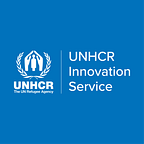Taking a participatory approach to enhancing online opportunities
In a series of community-based workshops, UNHCR has been working with and for refugees to improve digital livelihood pathways.
By Amy Fallon, Associate Innovation Officer
Even before the COVID-19 pandemic accelerated the widespread adoption of online work, refugees have been quietly navigating the digital economy — finding, creating, and benefitting from livelihood opportunities that are unbound to their physical locations.
Since 2020, however, the international conversation around refugees’ access to and participation in online work has grown louder, sparking numerous initiatives and significant research on the topic worldwide. Much of this research has been geared toward understanding the barriers and risks limiting refugee access to the digital economy, but surprisingly little work has been done to evaluate and understand the best possible solutions to address these barriers. Even rarer are concerted efforts to directly engage with refugee populations — both those aspiring to access digital livelihoods, and those who are already earning in the digital economy — to seek their input on potential solutions and improvements to existing initiatives.
So, at the beginning of 2023, UNHCR, the UN Refugee Agency, set out to better understand what does and does not work for refugees at each phase of their engagement with the digital economy — from preparatory training to working — and what solutions they think humanitarian and development actors should be pushing forward to make working online a safer, more inclusive route toward self-reliance.
In partnership with behavior change lab 17 Triggers, UNHCR conducted a series of community-based workshops across seven countries over five months. For each country, one urban and one camp-based location were selected. The resulting research series — Improving Digital Livelihood Opportunities for Refugees: Using community-based workshops to co-create solutions — is a foundational element of the PROSPECTS Partnership project on the Promotion, Inclusion and Protection of Refugees in the Gig Economy. The project is jointly implemented with the International Labour Organization and funded by the Ministry of Foreign Affairs of the Netherlands through its PROSPECTS Opportunity Fund.
Methodology
In total, 62 workshops were held, with 541 participants, including a mix of refugees and host community members, across Kenya, Ethiopia, Uganda, Egypt, Iraq, Lebanon, and Jordan. Overall, 47% of participants were female and 53% were male; 93% were refugees, with the remaining 7% composed of host community members. Average ages in each country ranged from 25–37 years old.
In each workshop, researchers facilitated discussions and activities using human-centered design methodologies customized to each country’s context. On day one of each workshop, for instance, participants were encouraged to create hypothetical personas to draw out the barriers and challenges specific groups face while working or trying to work online. On day two of the workshops, participants worked together to develop possible solutions to the barriers and challenges identified the day before, through hands-on co-creation activities.
Findings and feedback
Following the completion of all workshops, the project team drafted seven country briefs and a synthesis report detailing key findings as well as strategic recommendations.
The research findings centre on four main behavioral insights that help explain why many refugees are limited in progressing deeper in digital work, and how humanitarian and development organizations may better support them to overcome behavioral barriers. These insights are:
1 Many refugees lack information about potential avenues for digital work and how to access them. Often, the pursuit of digital work is sparked by training programmes that introduce digital work opportunities — rather than a pre-existing awareness and desire to engage in digital work driving participation in such programmes. As a result, participant commitment can be weak and trainees often acquire skills that are disconnected to their realities, aspirations or expectations.
2 Refugees don’t always believe that they can be successful through digital work. Even for those who are motivated, digital work often feels overwhelming and confidence in their abilities can falter. The transition period following training programs is a key part of the learning-to-earning journey, when support is needed to ensure refugees don’t drop off their pursuit for digital work.
3 Digital work remains aspirational, despite some risks. Although slow progress and low initial returns, as well as scams and fraud, can undermine the shift towards digital work, individuals remain determined to enter this sector.
4 Refugees encounter obstacles outside their control along their journey, undermining their progress toward digital livelihoods. Infrastructure is a foundational requirement. Additionally, refugees may lack the financial capacity to assume the risks often associated with success in digital work. Difficulties in receiving payments and the risks of getting blacklisted by platforms contribute to frustration, fatigue and failure — especially for freelancers. Meanwhile, women encounter gender-related obstacles and risks.
Based on these and many more detailed insights, both strategic and tactical recommendations were developed. This combination of high-level and practical pointers is intended to support practitioners to enhance the design and implementation of digital employment initiatives and smooth the learning-to-earning journey.
🌟 To access these recommendations, read the full report.
Importantly, draft findings and recommendations were shared with and validated by refugee and host community members who had participated in the research process. Versions of the country briefs were sent to participants to solicit feedback and ensure accurate representation of their perspectives.
What’s next?
The findings and recommendations of this research will inform UNHCR’s ongoing digital livelihoods work, further enabling us and our partners to help unlock the potential of digital work and connect refugees with greater options to improve their livelihoods.
The participatory nature of this initiative is also intended to inspire other organizations to substantively include forcibly displaced communities in research processes, to inform more sustainable, effective, and inclusive solutions. Included in the report are workshop guides and resources to more tangibly facilitate efforts to conduct participatory research processes on this topic in other contexts.
Read the report in full and find out more about the PROSPECTS Project on the Promotion, Inclusion and Protection of Refugees in the Gig Economy.
